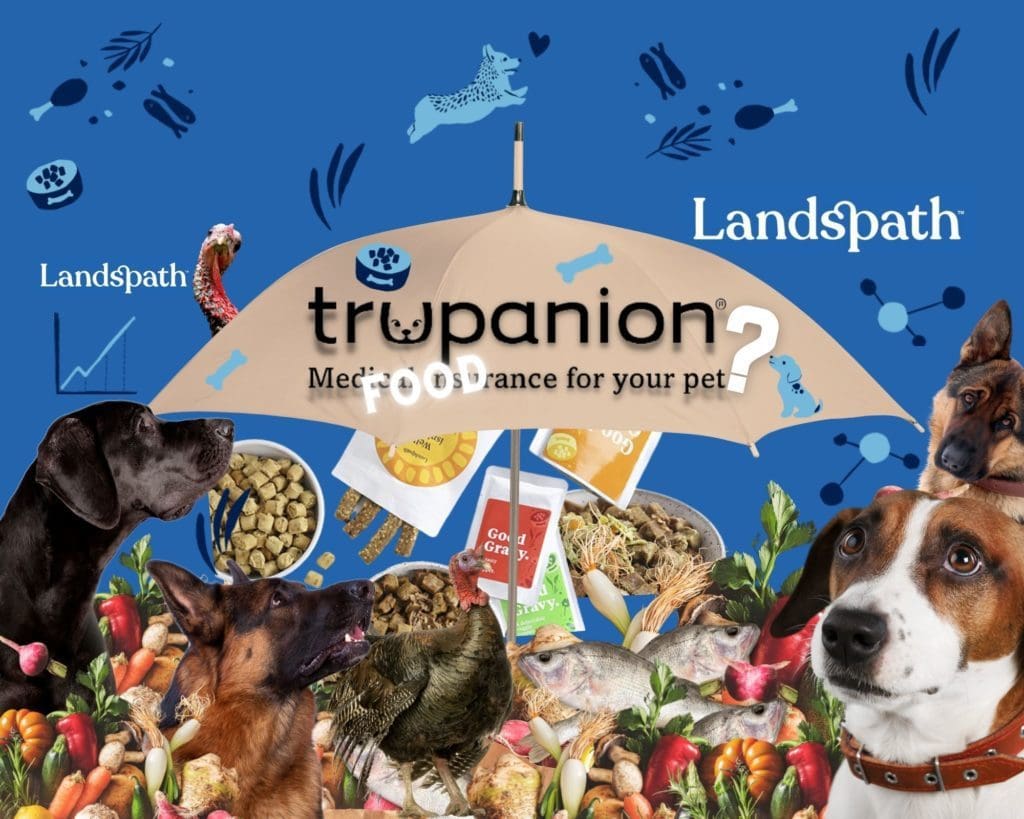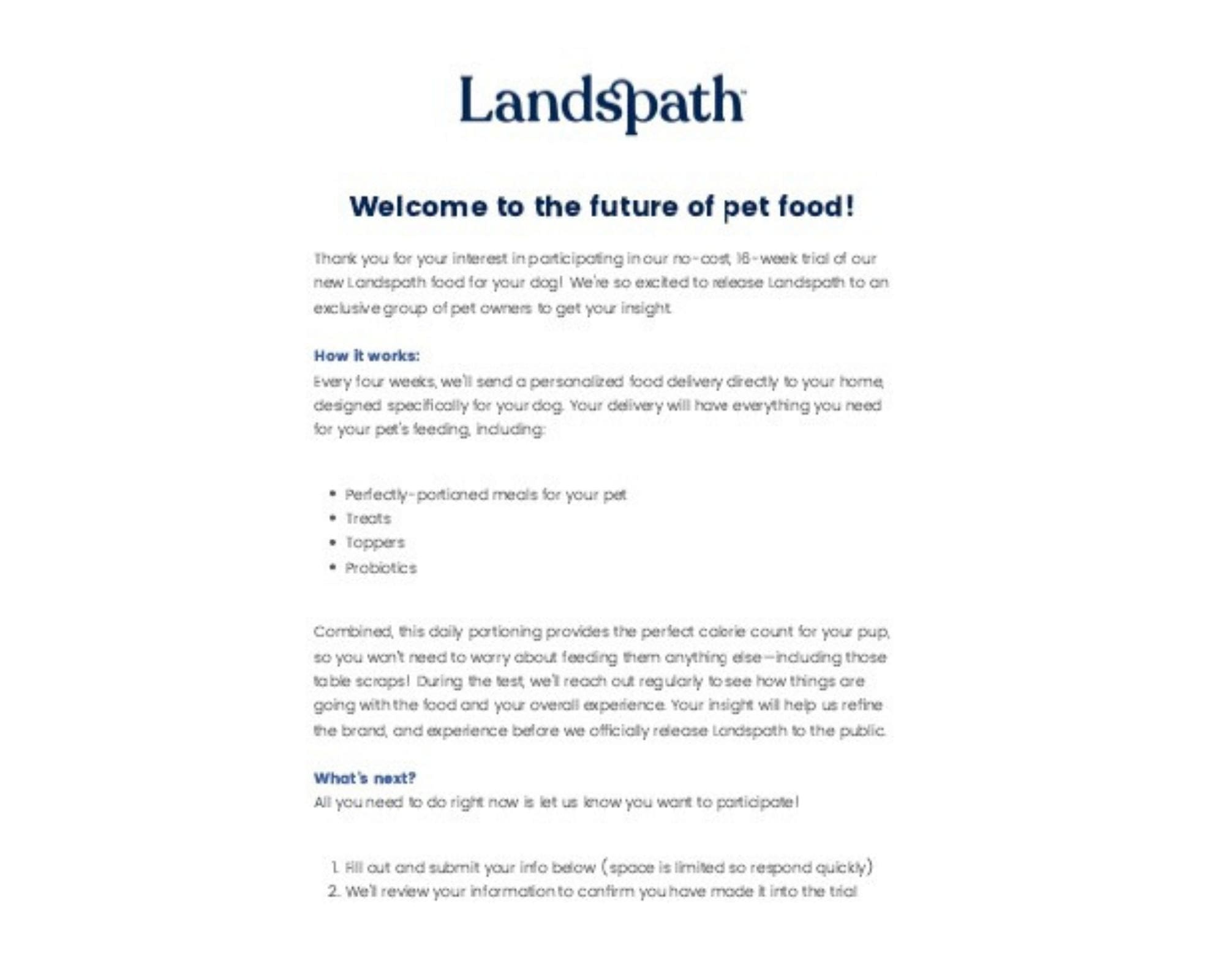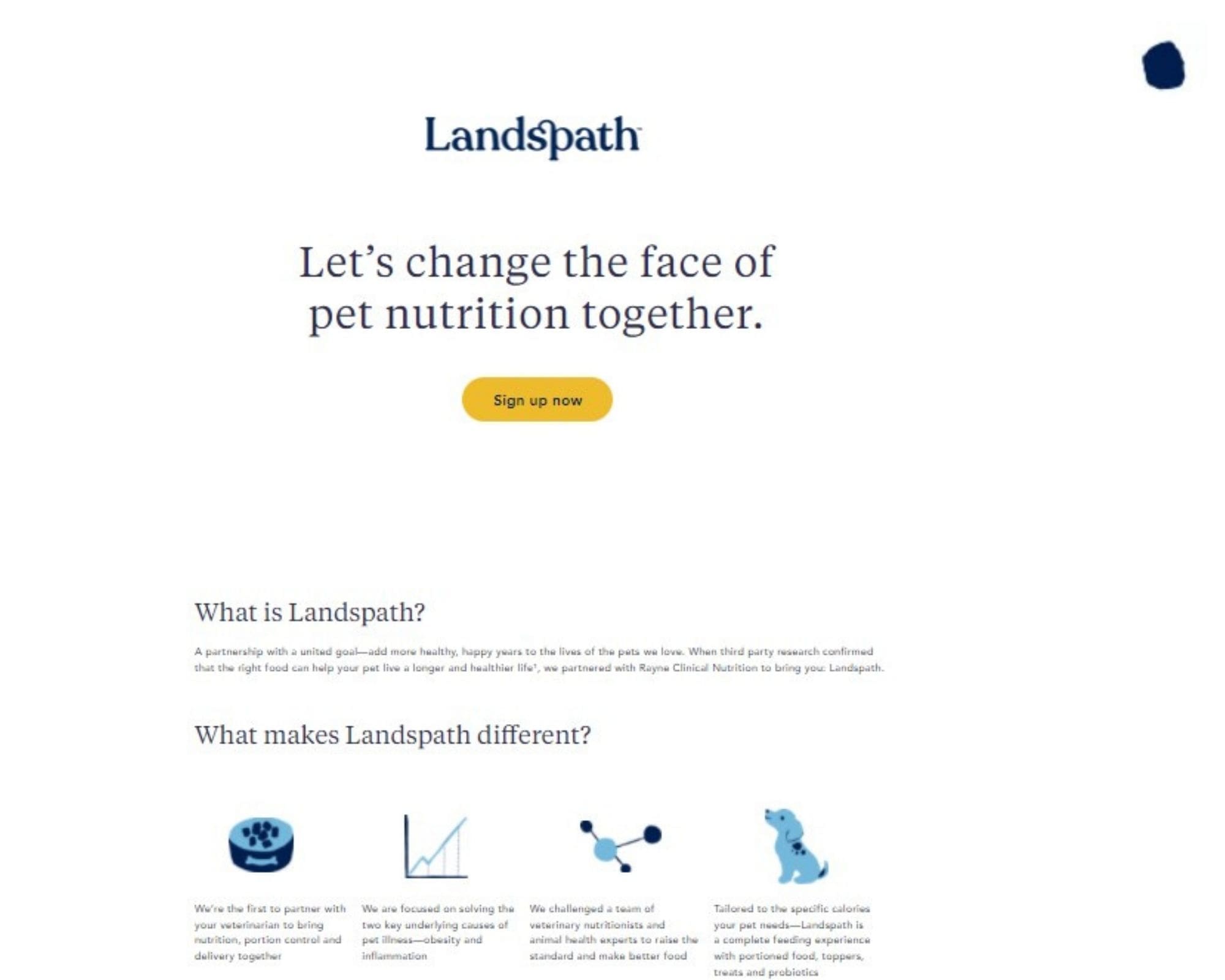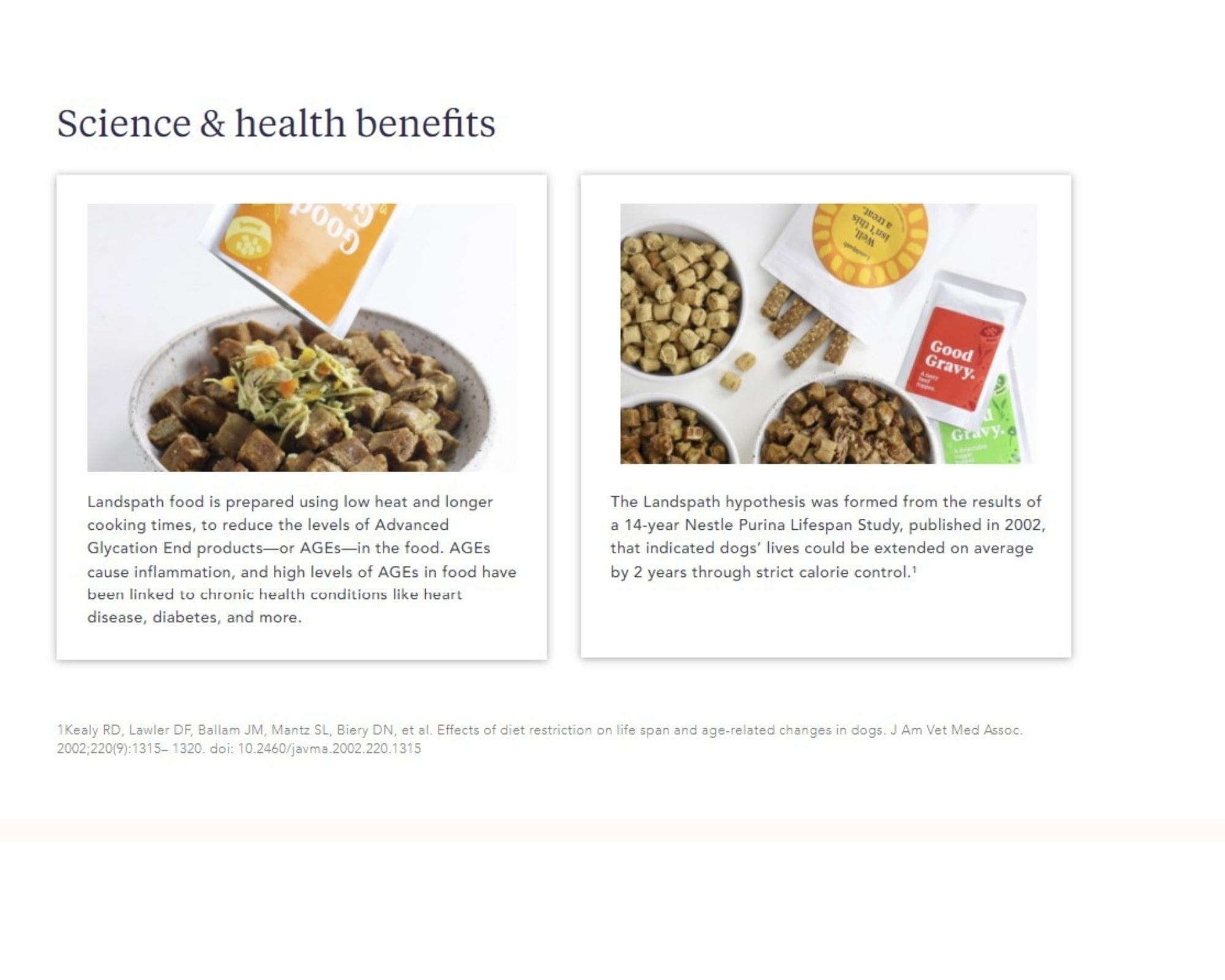Buy this dog food, lower your dog’s insurance rate?
What does pet insurance have to do with pet food? Can Landspath upend the pet food industry the way its parent company disrupted pet insurance? Vets will decide -- again.
An insurance company starting a pet food business seems bizarre, though less bizarre once you learn its founder is Darryl Rawlings, 52, an entrepreneur who founded Trupanion, Inc. (then VetInsurance International, Inc.) in 1998 when he was 29 while living on a boat with his dog in Vancouver, where he grew up–the first insured dog was Rawlings’ own dog, Monti, in 2000.
It may seem even less bizarre when you learn that Rawlings paid for the boat, a place to park it, and startup costs for what would become Trupanion using capital he earned from selling his first venture, a cigar business.
In fact, an insurance company getting involved with pet food may not seem bizarre at all when you learn that founder and CEO Darryl Rawlings was motivated to start Trupanion by a traumatic — and preventable — loss of his own dog when he was fourteen. His parents couldn’t pay the thousands of dollars for the emergency surgery necessary to save the dog’s life, Rawlings told me. It is the company’s founding story.
He left the veterinary hospital that day without his dog. The memory stuck. Helping people budget and plan for their pets is the problem he’s been obsessed with solving for over two decades. Rawlings says the goal is no different with Landspath, the years-in-the-making food initiative: “It’s based on the mission of what we’re trying to do as a company. Our goal is to help make it easier for pet owners to budget and care for their pet, period.”
Rawlings now lives on land with his family in Seattle (though he still spends August boating in Canada), where Trupanion and its 1,000+ employees are headquartered. Trupanion is now the second largest provider of insurance to cats and dogs in the U.S., the only pet insurer in the U.S. that owns its underwriter, the only major insurer that exclusively sells pet insurance, and the only U.S. pet insurer that can get around the reimbursement model with direct payment to the practice within minutes through Trupanion’s proprietary software, Trupanion Express.
If Landspath can be even a fraction of the disruption Trupanion has been, there could be a paradigm shift in the U.S. pet food market, the subsector of the pet industry American dog owners spend the most money. According to Packaged Facts and the American Pet Products Association, Americans had spent $40 billion on pet food by mid-year 2020. What if owners could choose between data-driven, validated pet food accountable to insurance regulators and pet food marketing?
Now, Rawlings is about to try to deliver on an idea he told TCR he’s been thinking about for more than a decade: Develop a new kind of diet for dogs on the premise that it will result in better health outcomes due to calorie restriction (already validated by a 2002 Purina study) and lower inflammatory properties (less validated, as veterinarians point out below). Once the company can validate that Landspath has an impact on health outcome with data to satisfy Trupanion’s actuaries as well as state regulators, Trupanion members whose dogs are on these diets would be eligible for discounts based on that data.
“Our mandate to the people who are formulating and creating Landspath,” Rawlings said, “not only the ingredients and the mix of ingredients, but how the food is–I don’t want to use word ‘processed’ because it’s not processed–but, how it’s taken from raw ingredients and gets to the pet owner, our goal with Landspath is for it to have the single best health outcome of any pet food ever.”
Can insurance regulators save pet food?
This may be one of the most interesting by-products of Rawlings’ plan to bundle pet food with insurance: in order for Rawlings to give me a ten percent discount on the $287 monthly Trupanion rate for my Labrador, he has to file for a new rate program with the New York State Department Financial Services, which regulates insurance in my state, and explain to regulators on what basis Landspath merits the discount. “I can’t launch it with claims of it being healthier,” Rawlings said, explaining how actuaries lend credibility to the product. “I could launch and say, ‘I’m going to measure this and find out if it’s healthier. [But] if it is and I get enough physical data, then I’ll pass that information along. And if you happen to have Trupanion and the Departments of Insurance and their actuaries say I can, at that point, give you a discount, I will,” Rawlings explained.
[And, yes, $287 is a lot of money for monthly pet insurance premiums, but the cost of care – which is one of the ways Trupanion calculates premiums – in my area is also more expensive. In truth, my only complaint about Trupanion is that I can’t pay more money for more coverage, specifically for Nellie’s allergies, which is a pre-existing condition in her case but one that I would gladly pay added fees for them to cover. As far as covered claims go, they’ve been terrific.]
Vets Will Be Pivotal
“The reality is we are vet-centric,” Rawlings asserted. “We’re looking at selling it only through vets. Do you think we’re going to do something that veterinarians wouldn’t like? That would be stupid! Why would we do something so stupid?”
After what was apparently a memorable courting period featuring “Darryl’s actuaries” – this is described colorfully by Rayne co-founder John Phelps later in the story – Trupanion announced it was partnering with Rayne in April 2019, and that the two would proceed with Landspath. According to Rayne COO Dan Pitts, several board-certified veterinary nutritionists have been engaged at various stages for consulting work on Landspath, primarily through Rebecca Remillard’s consultancy, including Laura Gaylord, Donna Raditic, and Joseph Bartges. Rawlings told TCR that beyond the people Rayne had contracted as consultants, veterinarians had yet to weigh in. But at least one outside veterinarian knows about Landspath and is, at least for now, a skeptic.
Jennifer Larsen is a renowned veterinary nutritionist at UC Davis. TCR considers her a go-to authority on a range of topics, including this one. We contacted Dr. Larsen and asked her if she was aware of the Trupanion food initiative and had any reaction. Larsen wrote back and told us that not only was she aware of it, but that she had offered Trupanion input in 2019.
“If I recall correctly, one of our referring vets forwarded me an email their Trupanion rep had sent to let them know about this program (including giving employees free bags of food info webinar etc.), she wrote, apparently referring to ‘friends-and-family’ trials Trupanion was conducting. “This was in early 2019. My concerns at that point really centered around their marketing strategies and how they planned to use incentives and data.”
In a separate email, Dr. Larsen wrote:
“I already told Trupanion a couple of years ago when they were developing this project that monitoring insurance claims on pets with owners that bought any particular brand would not tell them anything about the role of any particular dietary characteristic in health or disease, but they remain committed to this being a useful exercise (at best this is product testing and tells you nothing about nutrients etc. since the diets being compared differ in every way imaginable). I have no idea how they plan to use this data, but it is disappointing that they are using financial incentives for veterinarians to sell exclusive diets to their clients. I would love to see some science on their claims…”
In an email to TCR, Dr. Brennan McKenzie, who writes the popular veterinary blog “SkeptVet”, offered similar criticism when asked about the idea of Trupanion using its data to develop healthy diets:
Cause and effect relationships between complex environmental exposures and health conditions are very challenging to tease out, Dr. McKenzie wrote in an email. Look at how difficult it is to describe the nuances of the relationship between neutering and health, even though we know whether every single patient is or is not neutered.
In other words, monitoring disease incidence based on that data compared against the brand of food a pet is reported to be eating by its owner in their medical record is not necessarily going to be meaningful.
More Typical Scenario: Target’s refusal to name any “expert” veterinarian involved in Kindful pet food brand or even the manufacturer
It’s worth remembering that despite the fact that Landspath has not yet even launched, we already have more information about it than many pet food companies that have been around for years.
The more typical scenario is Kindful, a new in-house pet food brand launched by Target that TCR reported on recently. After a series of email exchanges with officials at Target over several days including executive vice president Katie Boylan, the company declined to name any veterinarian who was involved in any capacity with the research and development of Kindful. The company also refused to name the entity responsible for manufacturing the food. CEO Brian Cornell did not return our email request for comment. Landspath’s transparency posture has been exceptional.
Winning Vets’ Hearts and Minds
How well do Trupanion leaders understand nutrition in a veterinary context? How sensitive are they to the various controversies surrounding topics such as raw diet, or why the idea of research linking diet to DCM in dogs seems to spark more controversy than many religious debates? Are Trupanion’s leaders thinking about the possibility that veterinarians may not respond enthusiastically to non-veterinarians opining on nutrition, a topic many veterinarians spend a sizable portion of their lives battling “Dr. Google” and irresponsible reporting for the trust of their clients. What makes the Trupanion team dream that veterinarians want to listen anyone outside of the profession talk about nutrition?
“What we’re going to say to veterinarians,” Rawlings explained, is, ‘the reason that we are doing this is because we think a high-quality diet is going to have a better health outcome. We went to these [leading veterinary nutritionists and dietary] specialists and this is what they told us to make, and this is what we made. And, we’re going to share the data with you as we learn it. And go from there.'” Let’s assume that the spirit of what Rawlings said is more likely to apply since even if he wanted to give veterinarians access to their data “as they learn it” the logistics of real-time could get messy.
Moreover, Rawlings and his team have already done something in that regard rarely seen in the pet food industry: They not only have named their manufacturing partner, Rayne Clinical Nutrition, but also named the third-party co-packers. It’s a level of transparency the World Small Animal Veterinary Association insists on holding pet food industry stakeholders to. Still, it’s rare. Few if any companies disclose the use of co-manufacturers, let alone name them because, as veterinary nutritionist Lisa Weeth explains, when pet food relies on co-packers, quality control is inherently the responsibility of more individuals, thereby adding opportunities for missteps.
As Dr. Weeth explained in 2017 blog post: “This does not mean that co-packed foods are always bad and companies that make their own are always good but having manufacturing in-house will give the company greater control and accountability for the ingredients that come in and foods that go out with their names on it.” Companies that use co-packers, Dr Weeth explains (like Landspath) are not necessarily evil, but they should be able to answer when asked how the company ensures quality control e.g. independent testing or audits.
“If the feedback from the veterinary community is, ‘You’ve got to do XYZ [whatever it is], would you listen to them?’” I asked. “If the feedback [from veterinarians] was ‘XYZ,’ I’d probably do ABC all the way to Z. We don’t have a history of doing the minimum,” he said, referring to Trupanion.
The Unveiling
Approximately eight weeks ago, the Trupanion-Landspath venture quietly moved into a new phase: Landspath’s first consumer trials. In addition, Landspath.com went live and the ingredients were revealed:
The key ingredients for Landspath food is turkey, rice and oatmeal. There are different flavors of Landspath toppers to offer some flare and variety to your pet’s diet. The chicken, beef and veggie toppers are each crafted with chicken or beef broth, tuna, salmon and a combination of fruits and vegetables. Finally, Landspath treats are made with turkey, barley and cane molasses. Click here to view the complete Landspath ingredient deck.
“We’re not in a desperate hurry…”
“I think we’ve probably got a good six months to go before we’re in a position to start to expand it dramatically,” Trupanion Co-President Margi Tooth said when asked about the timetable. “We’re not in a desperate hurry,” she added. “We’re certainly not going to do it badly; we’re rolling it out at a level that we feel confident in, and we’re in a lucky position that we can do that without distracting the core business [Trupanion].”
At around the same time, the Landspath.com website quietly went live. “Welcome to the future of pet food!” the site exclaims (see below, first photo, far left) , adding, “We’ve been perfecting our recipe for three years…The purpose of the pilot is to learn from and improve our customer experience…”
Last June, shareholders were offered a ‘sneak preview’ of Landspath at the company’s annual shareholder meeting. “Ask tough questions!” someone wrote on a dry erase board during the opening remarks. The company packed in several hours of question-and-answer sessions and there was plenty of interest in Landspath, not surprisingly.
The website, though still in what seems to be a stealth launch devoid of any effort to publicize it, is full of information that was not available until recently, including the ingredients and even the names of the co-manufacturers, all in an exhaustive FAQ section.
According to Co-President Tooth and Rawlings, who spoke with us by phone in late September, the Landspath website has, indeed, not been optimized to appear earlier in search results. The company had not been seeking and had not anticipated publicity at this stage of Landspath, they explained. The reason the website had been put online, Tooth said, was to provide guidance to people participating in the Landspath food trials.
The trials consisted of ten dogs and their owners – all of them active Trupanion policy holders – as of September 27. The ten dogs and owners reside in Colorado and Arizona.
As far as process, Tooth said the team is looking for trends and that the trends don’t necessarily need to involve Landspath, but a subscription-based food is the only mechanism they’ve come up with to rationalize an assumption that the dog is eating only the Landspath diet (although some veterinarians will flag this assumption):
“If we know that someone is feeding their pet ABC food, and we know that 2000 people feed their pet ABC food and they have a lower risk of diabetes or they’re healthier in some way, we would share that information with the regulators, pet owners, and the people manufacturing the food,” Tooth said.
More to gain–or lose
By committing to selling Landspath exclusively through veterinary channels, Rawlings stands more to gain – or lose — depending on the reaction. Again, veterinarians represent Trupanion’s most valuable relationships. In political or marketing terms, they are his base. The company has built a veterinary-centric ethos and business model. Its unique and customer-loved proprietary software that pays consumers bills on the spot exists because veterinarians allow Trupanion Express, the proprietary software, to join forces with the practice.
By electing to sell the food exclusively through veterinary channels, Trupanion is placing still more of a burden, and risk on its relationships with vets. Add to that the fact that insurance actuaries will have roles in the oversight, along with the fact that many veterinary professionals are skeptical of lesser known, less-tests-to-show-for-it pet foods, and you have a variety of obstacles in the way of Rawlings’ vision of bundling food products with insurance products.
Thus, the lack of broad engagement so far with veterinarians is surprising, but short-term. Remember, Landspath has not yet launched. Moreover, publicity at this juncture would not have been their preference. Responding to one of the dozens of times I tried to frame my question about how they were approaching vets or how they were planning the approach, Rawlings said in May, “I’m thinking that where we’re at right now, we’re in test mode and making sure everything checks all the boxes. And once we finish all the quality control and we feel good about it, then we can start making decisions about how we’ll talk about it and where it will be done and all of that.”
According to Rayne COO Daniel Pitts, who spoke with TCR in May, several board-certified veterinary nutritionists have been engaged at various stages for consulting work on Landspath. Beyond consultants, they planned to engage veterinarians as Landspath makes more progress in research and development, Rawlings said.
Will the Skept Vet give the AGEs (Advanced Glycation End Products) philosophy his blessing?
“Are you doing focus groups?” I asked Rawlings.
“This isn’t marketing bullshit. I don’t need a focus group,” he responded. His disdain for market tests may make him popular with reporters, but what’s the harm in trying to preview how your key constituents will react before they react?
Perhaps Rawlings will consider The Skept Vet’s two cents on the “AGEs” (Advanced Glycation End Products) philosophy. Here’s how Dr. McKenzie responded when I asked him what he thought of the AGEs philosophy:
“There are some data suggesting AGEs may have potential negative health impacts, but these data are extremely limited and controversial….Pets do appear to ingest more AGEs from commercial pets foods than most humans do from a typical diet, but there is tremendous variation,” Dr. McKenzie wrote. “The potential health impacts, if any, of this are purely speculative. I think research is warranted, but marketing claims regarding the health effects of diets based on the AGEs-content are not,” he concluded.
This kind of stinging rebuke from the omniscient Skept Vet could be trouble for Trupanion and Landspath. Still, as we reported, Rawlings says that his team is responsive to input from veterinarians in that if advised to do “XYZ” they would, instead, do “ABC all the way to Z.”
“Darryl’s Actuaries”
The Trupanion-Rayne partnership was formalized in April of 2019. John Phelps is the CEO and co-founder of Rayne Clinical Nutrition; he describes an intensive — and apparently memorable — vetting process in an interview last spring:
“Remember, Darryl’s standards – asking us to meet the hurdle of providing data to actuaries — Darryl’s company, Trupanion, is one of the only companies that has internal actuaries. So, we have to submit all this data to Darryl’s actuaries, they evaluate it, and then they send it on. If it passes through Trupanion’s actuary group, then the Trupanion actuary group submits it to the state actuaries. And so, Darryl was upfront. ‘Like, this is the process that I have to go through in insurance. So, if you don’t have the data, we can’t go through this process. You can’t claim two extra years or 25% less medical issues unless you have the data that an actuary can evaluate.”
Phelps and Rawlings met at VMX, the veterinary industry’s largest conference (held annually in Orlando), in 2018. It went well, so there was a second date: dinner in Las Vegas at the Western Veterinary Conference (WVC). They realized they had similar values, Phelps says, and thought similarly about veterinarians, and that was it. They decided to move forward. The next step, Phelps says, was more formal. Representatives from Trupanion visited their factories, and the company was audited:
“They looked at our formulas. What they liked about us besides the technology that we had was that when they we didn’t have that sort crazy marketing that you see in pet food, which is, ‘this will make your dog learn how to talk or this will, this will make your dog impervious to any disease.’ We just didn’t have the floss and the nonsense that exists in many pet food companies. They liked that. And then we also had this research project on inflammation,” Phelps said, referring to AGEs. “So, they said, well, what’s the purpose of the research? And we said, well, systemic diseases like diabetes, liver, disease, cancer, they’re all inflammation based. And we think that if we can reduce the inflammation in the animals, it can significantly improve the longevity and also reduce the amount of medical issues. And, and they were like, well, that’s what we want to do…“We didn’t really fully understand what their interest was until Darryl sat us down and said, here’s what he’s trying to do for insurance,” Phelps added.
Making it Believable
Last year’s annual shareholder letter offered a five-year plan for the company built upon six building blocks, one of which was Landspath. Asked what he thought of Rawlings’ plan, and Landspath in particular, a longtime Trupanion shareholder offered this reaction in early July 2021:
“I think if you’re Darryl and you started this twenty years ago and you got to where you are now, [you] might be somewhat immune to, ‘Oh, that’s really hard,’” the shareholder said “I love the Landspath idea,” he added later in the conversation. “I think it just makes so much sense. If I’m a vet or a pet owner, I’m rooting for this to exist. And as a shareholder, it could be pretty unbelievable.”
The core concept behind Rawlings’ vision has to be real – and believable. The AGEs philosophy is a theory that veterinarians are open to seeing data on, but critically, consumers – and their veterinarians – will have to be persuaded with the data, the methodology, and persistent transparency. If Rawlings can show with data that Landspath makes our dogs healthier, the implications for both the insurance and pet food industries are endless.




